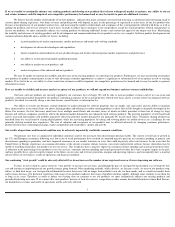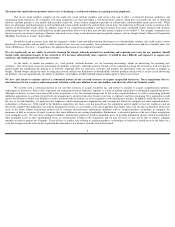Incredimail 2011 Annual Report Download - page 20
Download and view the complete annual report
Please find page 20 of the 2011 Incredimail annual report below. You can navigate through the pages in the report by either clicking on the pages listed below, or by using the keyword search tool below to find specific information within the annual report.
The tax benefits available to us require us to meet several conditions and may be terminated or reduced in the future, which would increase our costs and
taxes.
We have generated income and therefore, are able to take advantage of tax exemptions and reductions resulting from the "Approved Enterprise" and
"Beneficiary Enterprise" status of our facilities in Israel, albeit, during the period in the past when we distributed dividends, to a limited extent. To remain eligible for
these tax benefits, we must continue to meet certain conditions stipulated in the Law for the Encouragement of Capital Investments, 1959 (the "Investment Law"), and
its regulations and the criteria set forth in the specific certificate of approval. This pertains in particular to establishing that revenues are generated and based on
technology developed in Israel. If we fail to meet the required conditions in the future, the tax benefits would be canceled and we could be required to refund any tax
benefits we have received with interest and adjustment for change in Israeli consumer price index. These tax benefits may not be continued in the future at their
current levels or at any level.
Effective April 1, 2005, the Investment Law was amended. As a result, the criteria for investments qualified to receive tax benefits as an Approved Enterprise
were revised (the “First Amendment”).
As will be elaborated below, the Israeli Parliament approved recently an additional amendment to the Investment Law, which
revises again the criteria for investments qualified to receive tax benefits as a “Preferred Enterprise” for new tax benefits programs from January 1, 2011 (the “
Second
Amendment”).
No assurance can be given that we will, in the future, be eligible to receive additional tax benefits under this law and its amendments. The termination
or reduction of these tax benefits would increase our tax liability in the future, which would reduce our profits or increase our losses. Additionally, if as we are
contemplating, we increase our activities outside of Israel, for example, by additional future acquisitions or otherwise not based on technology based in Israel, our
increased activities might not be eligible for inclusion in Israeli tax benefit programs. If and when we were to discontinue our policy for not distributing dividends,
with respect to earnings from 2011 and beyond, tax-
exempt income generated under the provisions of the law will subject us to taxes upon distribution or liquidation
and we may be required to record deferred tax liability with respect to such tax-exempt income, possibly affecting our results in the future. See "Item 10.E Taxation —
Israeli Taxation —
Law for the Encouragement of Capital Investments, 1959" for more information about these programs, the Investment Law and the
abovementioned amendments.
Risks Related to our Ordinary Shares and their Listing on a Stock Exchange
Although we have paid dividends in the past, our policy since the beginning of 2011 is not to distribute dividends. Therefore, the return on investment in our
ordinary shares will be limited to the value of our stock.
We have paid dividends in the past, however as we announced, our current policy is not to distribute dividends, starting with the profits of 2011 and beyond.
If we do not pay dividends, our stock may be less valuable because a return on your investment will only occur if our stock price appreciates. See "Item 8.A
Consolidated Statements and Other Financial Information — Policy on Dividend Distribution" for additional information regarding the payment of dividends.
We incur significant costs as a result of being a public company.
As a public company, we incur significant legal, accounting and other expenses. We incur costs associated with our public company reporting requirements
as well as costs associated with corporate governance requirements, including requirements under the Sarbanes-
Oxley Act of 2002, the rules of the Nasdaq Stock
Market, the provisions of the Israeli Securities Law that apply to dual listed companies (companies that are listed on the Tel Aviv Stock Exchange ("TASE") and
another recognized stock exchange located outside of Israel) and the provisions of the Israeli Companies Law that apply to public companies. For example, as a public
company, we have created additional board committees and are required to have two external directors, pursuant to the Israeli Companies Law. We have also
contracted an internal auditor and a consultant for implementation of and compliance with the requirements under the Sarbanes-
Oxley Act. See "Item 5 Operating and
Financial Review and Prospects — Overview —
General and Administrative Expenses" for a discussion of our increased expenses as a result of being a public
company.
17
























